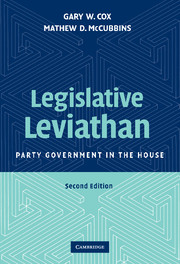Book contents
- Frontmatter
- Contents
- List of Figures
- List of Tables
- Acknowledgments
- Legislative Leviathan
- Introduction
- PART ONE THE AUTONOMY AND DISTINCTIVENESS OF COMMITTEES
- PART TWO A THEORY OF ORGANIZATION
- PART THREE PARTIES AS FLOOR-VOTING COALITIONS
- PART FOUR PARTIES AS PROCEDURAL COALITIONS
- PART FIVE PARTIES AS PROCEDURAL COALITIONS
- Conclusion
- Appendix 1 Uncompensated Seniority Violations, Eightieth through Hundredth Congresses
- Appendix 2 A Model of the Speaker's Scheduling Preferences
- Appendix 3 Unchallengeable and Challengeable Vetoes
- Appendix 4 The Scheduling Power
- Bibliography
- Author Index
- Subject Index
Conclusion
Published online by Cambridge University Press: 05 June 2012
- Frontmatter
- Contents
- List of Figures
- List of Tables
- Acknowledgments
- Legislative Leviathan
- Introduction
- PART ONE THE AUTONOMY AND DISTINCTIVENESS OF COMMITTEES
- PART TWO A THEORY OF ORGANIZATION
- PART THREE PARTIES AS FLOOR-VOTING COALITIONS
- PART FOUR PARTIES AS PROCEDURAL COALITIONS
- PART FIVE PARTIES AS PROCEDURAL COALITIONS
- Conclusion
- Appendix 1 Uncompensated Seniority Violations, Eightieth through Hundredth Congresses
- Appendix 2 A Model of the Speaker's Scheduling Preferences
- Appendix 3 Unchallengeable and Challengeable Vetoes
- Appendix 4 The Scheduling Power
- Bibliography
- Author Index
- Subject Index
Summary
American political scientists have had a long and stormy relationship with political parties. If we date the formation of a self-conscious discipline from the founding of the American Political Science Association (APSA) in 1903, then it is clear that the profession's initial attitude was decidedly negative – born of Progressive opposition to machine politics, a fascination with “scientific” administration, and such influential antiparty tracts as Mosei Ostrogorski's Democracy and the Organization of Political Parties (1902). As early as the middle of the century, however, the profession had reconsidered the value of parties – a reconsideration given corporate expression with the publication of the APSA's Toward a More Responsible Two-Party System in 1950. Where it once had sought to exorcise the demons of partisanship at the local level through civil service exams, nonpartisan elections, and other reforms, the post–New Deal APSA sought ways of bolstering party, taking it as axiomatic that “popular government in a nation of more than 150 million people requires political parties which provide the electorate with a proper range of choice between alternatives of action” (APSA 1950, 15). The APSA report feared that, without reform to strengthen the leadership of the congressional parties, Congress would be immobilized, interest groups empowered (pp. 19–20, 34), “excessive responsibility” shifted to the president (p. 14), and voters prompted to turn their backs on the parties in favor of a congeries of independent candidates or, worse, “extremist parties … each fanatically bent on imposing on the country its particular panacea” (p. 14).
- Type
- Chapter
- Information
- Legislative LeviathanParty Government in the House, pp. 255 - 258Publisher: Cambridge University PressPrint publication year: 2007



